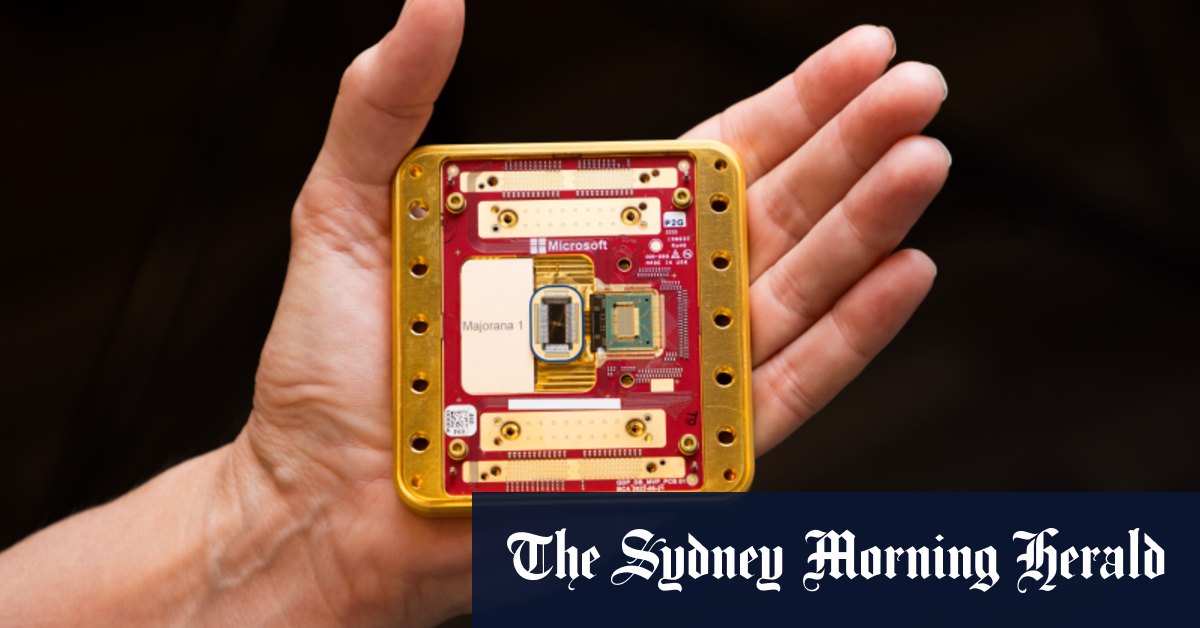Australia
Microsoft says powerful quantum computer just years away

Microsoft’s Breakthrough in Quantum Computing: A Leap Toward a Powerful Future
Microsoft has made a groundbreaking announcement that could revolutionize the world of computing. The company claims to have achieved a significant milestone in quantum computing, bringing us closer to a commercially viable quantum computer. This breakthrough could potentially lead to a machine more powerful than all the world’s computers combined—within just a few years, rather than the decades previously predicted. This development is not just a step forward for technology; it could usher in a new era of scientific discovery and innovation.
The Power of Quantum Computing: Unlocking the Atom
Quantum computers operate on a fundamentally different principle than classical computers. While classical computers use "bits" that flip between 0 and 1, quantum computers use "qubits," which exist in a "superposition" of states, meaning they can be both 0 and 1 at the same time. This unique property allows quantum computers to perform calculations at an exponential scale, making them infinitely faster than classical computers for certain tasks.
Scientists are particularly excited about the potential of quantum computers to simulate the complex interactions of molecules. This capability could accelerate our understanding of health on an atomic level, leading to breakthroughs in drug discovery, the development of new chemicals, and even the creation of self-healing materials. For example, quantum computers could simulate the behavior of molecules in unprecedented detail, helping researchers design more effective medications or materials that can adapt to their environments.
Microsoft’s Majorana 1 Chip: A New State of Matter
At the heart of Microsoft’s breakthrough is a new quantum chip called Majorana 1. This chip is built on a new state of matter and harnesses a mysterious particle that, until now, existed only in theoretical models. The particle in question is the Majorana fermion, a quasiparticle that could be the key to achieving stable and scalable quantum computing.
The Majorana 1 chip was crafted atom by atom using aluminum and indium arsenide, a semiconductor commonly used in night-vision goggles. This precise engineering allows the chip to host eight qubits, a small but significant step toward the million qubits needed for real-world applications. Microsoft envisions a future where quantum computers with such capabilities could fit in the palm of your hand, making them accessible for solving some of humanity’s most pressing challenges.
A Twenty-Year Quest for a Topological State
Microsoft’s journey into quantum computing began over two decades ago, with a focus on creating a new form of matter known as a "topological state." In this state, quantum information is distributed across a network of atoms rather than tied to a single particle. This approach is crucial because it reduces the likelihood of quantum information being disrupted by environmental factors, a common problem known as "quantum decoherence."
The company’s corporate vice president of quantum, Zulfi Alam, emphasizes the significance of this achievement. "These calculations are so complicated that if a classical computer was as big as this entire planet, it would still not be able to compute it," Alam said. "A quantum computer can do it, and can do it very, very well." This statement underscores the vast potential of quantum computing to tackle problems that are currently unsolvable with classical computers.
Real-World Applications: From Medicine to the Environment
The implications of Microsoft’s breakthrough extend far beyond the realm of theoretical science. Quantum computers could revolutionize industries such as healthcare, manufacturing, and environmental science. For instance, they could be used to design a catalyst for breaking down microplastics, a critical step in addressing the global plastic pollution crisis.
In the field of medicine, quantum computers could accelerate the discovery of new drugs by simulating the behavior of molecules at an atomic level. This could lead to breakthroughs in the treatment of diseases that are currently incurable. Additionally, quantum computers could enable the creation of advanced materials with unique properties, such as self-healing concrete or lightweight yet ultra-strong composites.
The Quantum Advantage: A New Frontier for Humanity
Microsoft’s achievement is a testament to human ingenuity and the boundless potential of science. The development of a commercially viable quantum computer is no longer a distant dream but a tangible goal within our reach. As we stand on the brink of this new frontier, we are reminded of the transformative power of technology.
Quantum computing is not just about creating faster and more powerful machines; it’s about unlocking new possibilities for human progress. Whether it’s advancing medical research, solving environmental challenges, or driving innovation across industries, the potential of quantum computing is limitless. Microsoft’s Majorana 1 chip is a significant step in this journey, and it’s just the beginning.
As we look to the future, one thing is clear: the era of quantum computing is here, and it’s going to change the world in ways we can barely imagine.











